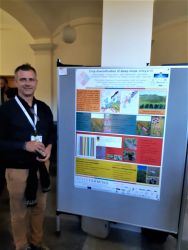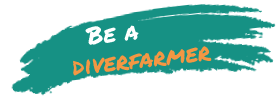The first works of the European project on the deterioration of the soils in vineyards are presented
The researchers Manuel Seeger and Thomas Iserloh from the University of Trier defended two scientific communications on crop diversification in the Central European Conference on Geomorphology and Quaternary Sciences held from the 23rd to the 27th of September in Giessen (Germany). As representatives of the Diverfarming project, financed by the European commission within the H2020 programme, the researchers showed the clear relationship between crop diversification and the soil structures.
 One of the objectives that the project seeks is to end the soil erosion that causes major economic losses to those working in agriculture due to a fall in their lands’ productivity. This erosion derived from the lack of organic material in the soil diminishes the lands’ fertility. To fight against this, the project’s research team opts for different techniques combining crops and reducing the application of chemically-synthesised fertilisers or pesticides. With the combination of these practices they seek to increase the soil organic matter content, increment the biodiversity and recover fertility.
One of the objectives that the project seeks is to end the soil erosion that causes major economic losses to those working in agriculture due to a fall in their lands’ productivity. This erosion derived from the lack of organic material in the soil diminishes the lands’ fertility. To fight against this, the project’s research team opts for different techniques combining crops and reducing the application of chemically-synthesised fertilisers or pesticides. With the combination of these practices they seek to increase the soil organic matter content, increment the biodiversity and recover fertility.
By means of their works “Extreme soil erosion event in steep slope vineyards (Kanzem/Saar, Germany)” and “Diversification of crops in slope vineyards” Seeger and Iserloh explained how the farming practices carried out until now have caused the degradation of the soils and the reduction in biodiversity (with the economic risk this entails) and how Diverfarming’s proposals can resolve these problems and make European agriculture sustainable, and thus benefit both the farmer as well as the environment.
In their interventions, the researchers showed how these changes are being carried out in the slope vineyards located in Kanzem, which are part of case study 9 within the project. This experimental plot, diagnosed as suffering from extreme erosion and very reduced biodiversity, is being diversified by means of the introduction of aromatic herbs (thyme, oregano) between its alleys (in different episodes).
Specifically, these interventions took place within the working group in geomorphology (known as Geomorphologie), which is the forum of German geomorphologists that Seeger and Iserloh belong to. The diffusion of the project among the research personnel attending a conference of this size enables the studies in this field to be extended and provides knowledge to resolving the problem of soil erosion.
Diverfarming is a project financed by the Horizon 2020 Programme of the European Commission, within the challenge of “Food Security, Sustainable Agriculture and Forestry, Marine, Maritime and Inland Water Research and the Bioeconomy”, which counts on the participation of the Universities of Cartagena and Córdoba (Spain), Tuscia (Italy), Exeter and Portsmouth (United Kingdom), Wageningen (Netherlands), Trier (Germany), Pecs (Hungary) and ETH Zurich (Switzerland), the research centres Consiglio per la ricerca in agricoltura e l'analisi dell'economia agraria (Italy), the Consejo Superior de Investigaciones Científicas (Spain) and the Natural Resources Institute LUKE (Finland), the agrarian organisation ASAJA, and the companies Casalasco and Barilla (Italy), Arento, Disfrimur Logística and Industrias David (Spain), Nieuw Bromo Van Tilburg and Ekoboerdeij de Lingehof (Netherlands), Weingeut Dr. Frey (Germany), Nedel-Market KFT and Gere (Hungary) and Paavolan Kotijuustola and Polven Juustola (Finland).










